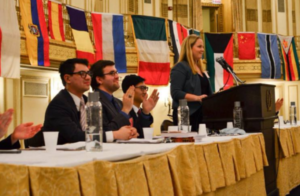Written by Isaac Wink, the Chief Strategy Officer of MUNUC. Congratulations to all who have won awards, and the staff of MUNUC 30 for a successful conference.

Secretary General Izzy Jorgensen makes introductory remarks at Closing Ceremonies.
This February, the University of Chicago hosted 2,700 delegates from 135 schools and 9 countries for the thirtieth annual session of MUNUC at Chicago’s historic Palmer House Hilton Hotel. The central philosophy of MUNUC is practical pedagogy, viewing Model UN as a tool for delegates to learn valuable real-life skills and more about the world they live in. Committee executives strove to provide a rewarding conference experience for first-time delegates and old pros alike, starting with meticulously researched background guides on topics from sustainable development in the Arctic to escalating tensions with North Korea.
At weekly meetings starting at the beginning of the year, the 200 University of Chicago students part of MUNUC not only went over conference logistics but also practiced skills such as tracking blocs and giving feedback on delegate speeches and resolutions. These skills were put into action during the conference weekend. The General Assembly and ECOSOC committees tackled issues facing the entire globe. The Continuous Crisis committees simulated turning points of the twentieth century, such as Margaret Thatcher’s government in the United Kingdom. The Regional Bodies and Specialized Agencies, meanwhile, narrowed in on specific corners of the world. Delegates in six of these committees were faced with single-session crises, in which delegates responded to an emergency situation, such as Scotland declaring independence and seeking European Union membership. After bringing the crisis to a conclusion, they returned to the work of resolution writing with a new perspective on the issue.
This year, MUNUC instituted several new initiatives to expand on its ability to provide the highest quality of debate to the widest group of delegates. A new financial aid program helped to cover the costs of hotel rooms and conference fees so that no school would face a financial barrier to attendance. Trainings leading up to conference were redesigned to put a new focus on providing delegates with useful feedback on every aspect of their performance and pushing them to exceed their own expectations, regardless of experience level. Members worked together to develop a Delegate Code of Conduct to make the expectations of cordiality and professionalism clear to all participants.
At conference itself, the Information Services team distributed its skills across the entire conference, so that even committees without crisis elements could receive visits from stakeholders in the topic of discussion who challenged delegates to explore the issue from every angle.
The Executive Committee for MUNUC 31 is already hard at work building on the achievements of the thirtieth session, looking for areas to improve upon, and steering the conference towards another three decades of success.

